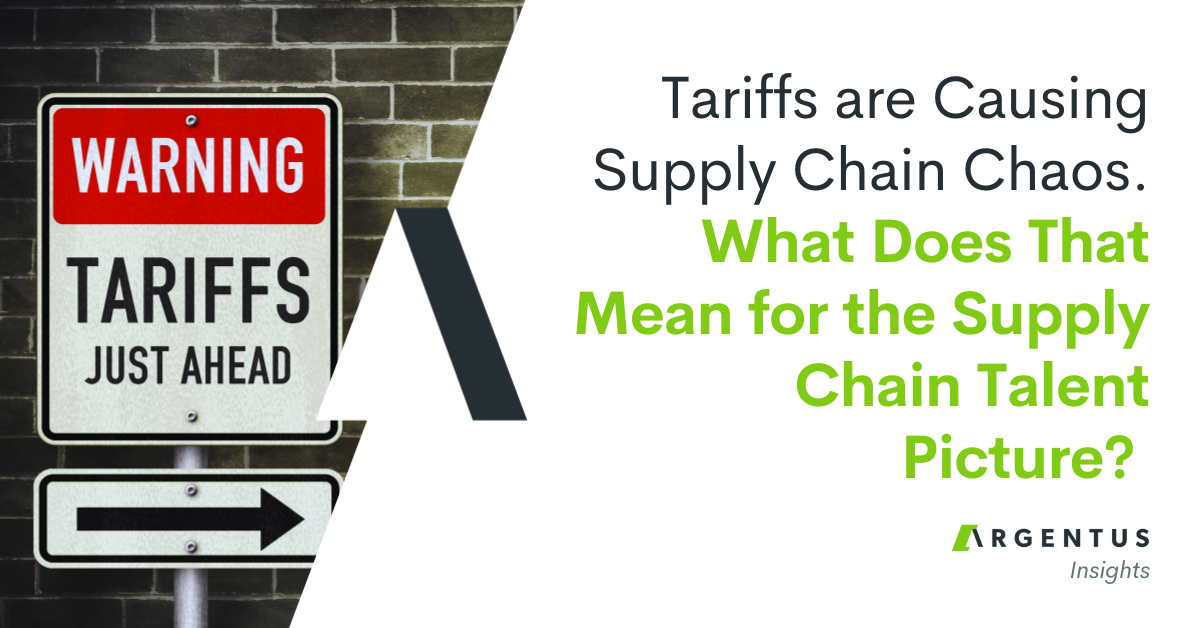Finding alignment between generation Z and Supply Chain talent needs.
 At the recent Supply Chain Management Association (SCMA) National Conference in Montreal – which we were thrilled to attend – talent was a big topic of discussion. At the conference, Argentus President Bronwen Hann spoke on a panel about the Future of Supply Chain talent. In short, there’s a shortage of skilled Supply Chain professionals. It only stands to get worse, owing to three main factors:
At the recent Supply Chain Management Association (SCMA) National Conference in Montreal – which we were thrilled to attend – talent was a big topic of discussion. At the conference, Argentus President Bronwen Hann spoke on a panel about the Future of Supply Chain talent. In short, there’s a shortage of skilled Supply Chain professionals. It only stands to get worse, owing to three main factors:
- The retirement of the baby boomer generation, which is picking up pace.
- Changing skills requirements for practitioners as the field continues to digitize, and
- Most important for our post today: a lack of concerted, industry-wide initiatives to bring even more young people into the field.
As the panel discussed, some of these factors are changing. Supply Chain is a career of the future, and more young people are waking up to its potential. More young people are choosing to get into the field, rather than “accidentally” ending up in it, as has been the custom.
There’s progress. But now that we’re seeing a changing of the guard – an entrance into the “Future of Supply Chain Talent” that the panel discussed, companies are competing for the next generation. So the panel discussed how to appeal to millennial talent – how to offer more work/life balance, meaningful projects with social impact, and other factors that tend to speak to people of that demographic.
Millennial talent is important. It will be important for the next – let’s check our watch – 30 years. But you might have heard about the next talent demographic beyond millennials:
Generation Z.
We wanted to write a post to talk about this generation, what differentiates them from millennials, what they’re looking for in a career, and offer some initial strategies for how to help attract and retain them.
As a caveat: these generations are – as they say on the tin – generalizations. Individuals’ career motivations are often similar in the broad strokes, but very different from person to person. Still, as an organization, it makes sense to align your strategy based on a reading of the demographics. And Generation Z is becoming a crucial demographic.
So here’s some background:
Generation Z is generally considered to include people born between 1997 and the 2010s, as opposed to millennials, who are born between 1980 and 1996. As arbitrary as these distinctions sometimes seem (who draws the line? Why at 1997, rather than 1998?), they do have relevance in terms of the shifting priorities and needs of the new generation of workers. If you’re just getting acquainted with Generation Z in the workplace, it might be surprising to find that Gen Z already comprises 25% of the U.S. population. According to Supply Chain Dive, 40% of consumers will be Gen Z by 2020.
Some key characteristics of Generation Z, in comparison to millennials:
- Millennial workers have often used digital technologies from a young age, but most have some memory of a time before these technologies. Generation Z workers are true digital and social media natives.
- Whereas Millennials entered the workforce in a time of extended recession following the 2008 financial crisis, Generation Z is entering the workforce during a time of economic growth.
- Generation Z is more diverse than previous generations, with 49% identifying as non-white (compared to 44% of Millennials, 40% of Gen X, and 28% of boomers).
- According to research, 72% of Generation Z workers prefer face-to-face interaction.
- 75% want to have multiple roles within an organization.
- 77% expect to work harder than previous generations.
- 80% prefer to work for a mid-size or large-size company.
The stage is set for the most strategic companies to gain an edge. As much as brands are figuring out how to market to this generation, companies need to be figuring out how to hire them. Gone are the days when companies have all the leverage in the process. Companies hiring Generation Z workers need to get over the perception that they’re “giving a junior candidate a break.” They need to embrace the unique contribution that Generation Z talent will provide, and realize that they’re competing for talent as much as the emerging generation is competing for top jobs.
So what does this mean for Supply Chain hiring managers, and HR contributors setting their talent strategy going forward? How do you appeal to Generation Z talent, and more importantly, retain those individuals once you’ve brought them on?
- There are more educational opportunities in Supply Chain than ever before, and word is getting out about what Supply Chain Management offers to young people as a career. That means there are more people entering the field
- Hiring a generation of digital natives means investing in digital technology to improve your data position and SCM visibility. If your Supply Chain function hasn’t adopted the latest technology, the strongest candidates will keep shopping for companies who have. For example, if you’re still using Excel for your Supply Planning process, you’ll have trouble getting the top candidates – unless you empower those candidates to help with a business transformation to a more modern ERP system.
- Despite being the first generation of complete digital natives, the fact that Generation Z tends to prefer face-to-face interaction bodes well for companies that foster collaboration in their Supply Chain process. Companies with siloes between sub-functions, that pass off data to each-other with little interaction or collaboration, will send Gen Z employees running.
- Generation Z’s preference for holding multiple roles in an organization dovetails well with our preferred Supply Chain talent strategy, of rotating junior employees through functions to help expose them to different aspects of Supply Chain Management. Stick a Generation Z employee in one role, with little opportunity to move on, and they’ll hop to a new organization. Give them opportunity to learn about various aspects of the Supply Chain (Demand Planning, Logistics Planning, etc.), and you’ll foster a sense of growth, while also helping to break down the silos we mentioned above.
We should mention, these are just a starting point – the beginning of a conversation about how to most effectively bring Gen Z into the Supply Chain Work force.
Make no mistake, companies still have to appeal to millennial talent, and Gen X talent, and Baby Boomer talent. But the need to align organizational goals for Generation Z is on the horizon – or, depending on your perspective, it’s already here.
But what are your thoughts? What strategies does your organization have to attract and retain Gen Z talent as it enters the workforce? ![]()




0 Comments